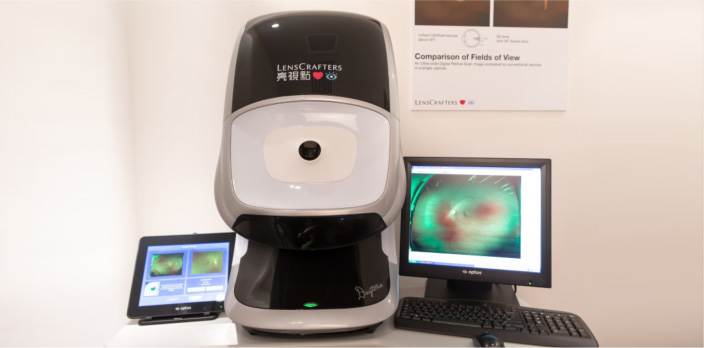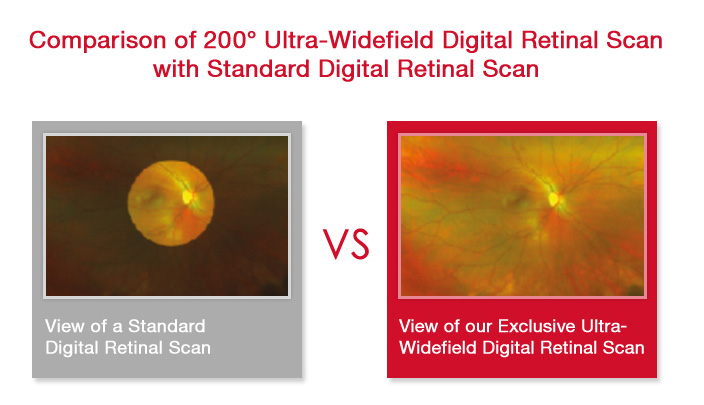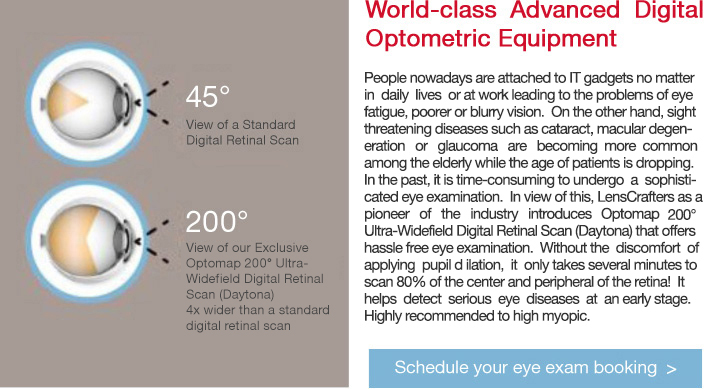Optomap 200°Ultra-Widefield Digital Retinal Scan (Daytona)
.gif)


1. What is retina?
Retina is a light sensitive layer of the eye with photoreceptors, like the film of a camera. As it cannot be regenerated, any damage or aging may result in permanent loss of eyesight or vision.
2. What is retinal photography?
Retinal photography is an examination for assessing retinal health. It can effectively examine eye conditions or other medical issues such as glaucoma, macular degeneration, diabetics, hypertension, etc.
3. Compared with the standard digital retinal scan, what are the differences?
200° Ultra-Widefield Digital Retinal Scan is 4 times wider than a standard digital retinal scan. The latter captures only 45 degrees of your retina. Without applying pupil dilation, it helps reveal more about your eye health conditions with wider area of your retina examined including peripheral area.
4. Why should I have a digital retinal scan?
In many cases, there might not be visible signs for retinal changes. Through detailed retinal check-ups, potential risks may be detected at an early stage and may lead to more effective treatment options.
For many aging conditions like having holes, they may exist on the peripheral without affecting the central vision. If the holes are not treated, chances of retinal detachment will increase which may threaten your vision. This is why an examination on the peripheral of your retina is so important.
Regular eye scans help us build a clear digital picture of your eye health over time for an electronic optical profile. By comparing scans, it is easier to check for subtle changes that might indicate the early signs of disease.
5. I have clear vision, do I still need a scan?
Having clear vision only implies that you are having no significant signs of eye problems with your center of your retina (macular). The retinal scan could assess the center as well as the peripheral of the retina. Even if you are having clear vision, it does not mean that you are having good retinal health in other words.
By retinal scan, some potential eye diseases such as retinopathy, macular degeneration, retinal breaks, retinal detachment and other general health diseases like diabetes and hypertension can be detected by comparing small changes over time.
We will then discuss the results with you and your digital scans will be kept on file. Over time, this helps us to build an optical profile of your eye health so that if there is any subtle change in appearance, we can act early.
6. How is the examination carried out?
Without pupil dilation, with simple steps in just a few minutes, it eases your discomfort on pupil dilation which is usually associated with blurry vision and sensitiveness to light for up to 4 to 6 hours. You may now have a scan at any time you like.
7. What are the target groups?
Everyone could conduct this examination. There is no one who can anticipate one's retinal changes especially when there is no correlation between the peripheral retinal change and age factor. We recommend an annual scan as a routine eye check-up for everyone. But if you are high myopic (-6.00), diabetic, with family case history of retinopathy or experiencing flashes, you are more in need of this scan.



